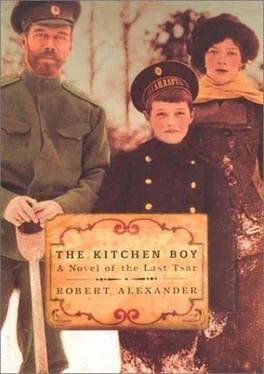Oh, how he wished May were here. She would know. His wife who always had a word on her tongue would tell him whether or not he was saying too much, too little, or if he was getting it just right. Bozhe moi , my God, how he couldn’t wait until this life was over.
He pushed back his chair, grabbed ahold of the edge of his desk, hesitated, and pushed himself to his feet. Then he just stood there. Everything used to be so automatic, now he had to think about every little step. He started to move his left leg, but then a bolt of pain stabbed his bad knee. Wincing, he leaned on the desk with one hand, hesitated, tried again. It was always like this, at first walking seemed impossible, but after the first few steps he seemed to be able to walk out of it. And so he proceeded.
He’d always been amazed that the slaughtered bodies of the Romanovs had remained hidden for so many, many years, and in fact he had often wondered if they’d ever be found, particularly within his own lifetime. And it wasn’t until July 11, 1991, the day after Boris Yeltsin’s inauguration, that a squadron of detectives, colonels, epidemiologists, and forensic experts headed out of Yekaterinburg toward the village Koptyaki. It was there, behind a fence, underneath a tent, and in the glare of all these lights, that the herd of Russian officials pulled more than a thousand smashed and crushed bones out of the mud. Even then they weren’t sure what they found. Seeking the truth but lacking DNA technology, the Russian scientists developed a sophisticated technique of computerized superimposition, whereby their mathematicians matched photos of the Romanovs to the skulls they found. And that was how, Misha had read, they determined that skull number four – the very one that contained a desiccated brain shriveled to the size of a pear – was none other than Tsar Nikolai. Skull number seven, meanwhile, proved the easiest to identify because of its extensive and beautiful dental work. It was that of the Empress Aleksandra.
Ach, thought Misha, crossing the broad living room, as the saying goes, There exists no secret that will not be revealed. And those broken and bizarrely crushed bones found in that shallow grave quickly told the story that the deaths had not only been violent, but grossly brutal, which was absolutely correct because of course Misha had seen it all with his own eyes. The most shocking thing the Russian specialists discovered, however, was what they didn’t find: the bodies of both the Heir Tsarevich Aleksei and Grand Duchess Maria. And so that was his job, Misha’s. Now it was up to him to tell why the bodies of two Romanovs were still missing. His story, his truth, was what he would leave behind and it would be, he was certain, the definitive truth that would stand for decades if not centuries.
So sad, thought Misha as he hobbled along, so terribly sad. Not just the murder of the Imperial Family, but that the hatred of the Russian Revolution proved so barbaric and violent. Slava Bogu , thanks to God, that at least the Romanovs had finally been laid to rest in an Orthodox service just last month in Sankt-Peterburg. Misha had procured a videotape of the funeral, and May and he had watched it over and over, all of which filled them both with a sense of peace. And then a mere three weeks after the funeral in Peterburg, May herself had died, content with the knowledge that the revolution that had burned across their homeland was done and over.
With a heaviness that had hung from his heart since that night so long ago, Misha went about his business. He visited the downstairs powder room just off the central hall, and then briefly headed into the kitchen, where he poured himself a glass of water. Carrying the glass, he returned via the butler’s pantry, a narrow room filled with stacks of fine china and rows of crystal glasses. As he pushed open the swinging door into the dining room and gazed upon the massive mahogany table, he was reminded of all the fancy dinner parties they’d hosted. Here had dined not only the crème de la crème of Midwestern aristocracy – the Wrigleys, Walgreens, Swifts, Cranes, Maytags, and so many more – but also such international luminaries as Walt Disney, Ella Fitzgerald, Katharine Hepburn, and even the Prince of Wales. But it had all been a lie. He’d convinced all of Chicago society that he’d not only bought an immense amount of stock for practically nothing at the very bottom of the Depression, but that he’d been one of the first investors in IBM, buying what would become a fortune in stock for just pennies. So that everyone would think him of good breeding, Misha himself had planted the rumor that his parents were minor aristorcrats who had been horrendously slaughtered by the Bolsheviki . And then Misha moved into a new life in America, going through the motions of great happiness, buying this huge house, playing golf at the exclusive Onwentsia Club, and throwing extravagant parties. Yet it had all meant nothing, nothing! No, everything that he saw was in the context of how ugly, how cruel, was this world and its human race. Try as he wanted, Misha could barely love even his own boy, that which his own seed created. He made an effort, sometimes with success, to care for his Peter, but every time he gazed into his face he saw but one thing: his own reflection. Absolutely, mused Misha, as he moved through the room. In his own child he saw living proof that he had survived, and it was almost more than he could bear, for Misha had never been able to escape from the belief that it should have been him who was shot in the basement chamber, it should have been him dead on that road to village Koptyaki.
His head hung low, his shuffle slow, Misha crossed into the living room, muttering as he so often had, “Lord forgive me. But first make me suffer. I am the devil’s creation. Torture me and make me cry out for mercy, but make me suffer…”
Entering his office, he paused and admired the wall of books on his Nikolai and Aleksandra, some three hundred volumes altogether. His will stipulated that these should be donated to Yale for their-
Misha’s eyes suddenly caught a magazine wedged between two books. Oh, my dear God, he thought, his heart jumping in pace, didn’t I get rid of that? Apparently not. He placed the water glass on the edge of his desk, then pulled down a worn and well-read issue of Esquire magazine that had appeared five years ago. He flipped it open to a dog-eared page, and even though Misha had read and reread the piece, he couldn’t stop himself from once again studying the article entitled, “What Really Happened That Dark Night?” Nothing before had ever come so close to the truth. Nothing had ever scared him so much, and his eyes flew threw the entire lengthy piece, scanning every paragraph, until he came to the last few.
Although unlikely, one or possibly two of Nicholas and Alexandra’s children could have survived that horrible night of July 16-17, 1918. Between the time of the execution and their nefarious burial miles away, anything could have happened. Many suspect a guard discovered that one of the girls was alive and pulled her from the truck as it passed down that dark, dirt road to the Four Brothers Mine. After all, while the bodies of five Romanovs have recently been found and identified, the bodies of two of the children, Alexei and Maria, are still missing. Where are they? What happened to them? Yurovsky, the commandant in charge of the execution, later claimed to have burned them and scattered their remains, but this, say scientists, is doubtful, for it is impossible to completely cremate a body over an open fire.
The theories abound, of course. Some say that Maria was later spotted on a train headed for China. Others, including survivors from a nearby monastery, claim she wandered Siberia until her death in 1973.
Читать дальше












